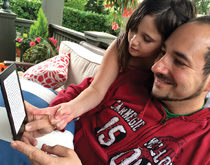Jeff Kunins’ 9-year-old daughter is reading Frances Hodgson Burnett’s classic 1910 novel, The Secret Garden. It’s a challenge. Although the family lived in London for a spell when Kunins (DC ’95) was General Manager of Product for Skype, the book’s Yorkshire slang and Victorian details make it a demanding reading experience. He and his wife read the physical book with her at times. She also reads it to herself sometimes on a Kindle. “When you’re reading digitally, you have the full richness of the Internet at your fingertips to support what you’re reading,” he says. “That’s ‘differently awesome’ than print—in ways that I think are compelling.”
 He should know. Last spring, he became Vice President of Amazon’s Kindle Reader apps, responsible for their strategy and engineering across platforms from Kindle e-readers and Fire tablets to Kindle for iOS, Android, and so on. “I’m grateful to have the opportunity to help further grow one of the world’s most iconic products.” He adds, “Of course I had nothing to do with Kindle’s amazing success so far—my role is to help figure out how we keep innovating for our customers. How do we make Kindle do an even better job of inspiring the world to read more and get more out of reading every day on all their devices?”
He should know. Last spring, he became Vice President of Amazon’s Kindle Reader apps, responsible for their strategy and engineering across platforms from Kindle e-readers and Fire tablets to Kindle for iOS, Android, and so on. “I’m grateful to have the opportunity to help further grow one of the world’s most iconic products.” He adds, “Of course I had nothing to do with Kindle’s amazing success so far—my role is to help figure out how we keep innovating for our customers. How do we make Kindle do an even better job of inspiring the world to read more and get more out of reading every day on all their devices?”
That Kunins would play lead roles at prominent technology companies, also including Microsoft and Tellme Networks, probably came as no surprise to the man who first hired him, as an 11-year-old, to design an office computer system for a local industrial machine company. Yes, that’s right, at age 11. He started playing around with a Commodore VIC-20 as a fourth-grader. Pretty soon, he was programming his own games. When his mother saw an ad in a Long Island paper for a temp to help the company’s owner design an IT system, she called him straightaway and persuaded him to give the kid a chance.
“He was being frugal, decided he had nothing to lose, and he took a bet on me,” Kunins remembers. He ended up working for him most of the way through high school, running the IT gamut, starting with consulting. “I helped him pick his first office computers and software. I wrote all the code to do what he needed for his accounts payable, patent tracking, and customer database. Then I did all the data entry,” he says. “And then after data entry, I would sweep the shop floor.”
Although Kunins may laugh as he tells the story of that first job, it also reveals—at an age when most kids can’t remember to brush their teeth at night—remarkable drive and ability. “Just as now, I certainly wasn’t the most prolific or sophisticated programmer,” he says. “But I hope I had a good mix, even then, in thinking about what made interesting and good products and how to talk about them, balanced with being technical enough to roll up my sleeves and contribute directly.” In fact, for his track record in those areas, he was recently presented with Carnegie Mellon’s 2014 Alumni Achievement Award.
If Kunins sees digital reading as “differently awesome,” perhaps it’s because of the duality of his own interests. He was drawn to Carnegie Mellon for its uniqueness as a world-class school in both the arts and the sciences. That was convenient, because he was accepted into both the information systems department and the conservatory program for musical composition. “I grew up with music always at the center of the house,” he says. “My father’s been a high school orchestra teacher for 50 years. He’s retired and gone back, twice. He’s one of those teachers that kids remember decades later.”
A “double geek” is how Kunins describes his younger self. He remembers being interviewed by a Long Island newspaper when he was a high school senior: “My embarrassingly obnoxious, too-full-of-myself quote was that my dream was to be the CEO of a multinational corporation by day and play in a piano bar by night.”
 Kunins chose to graduate in 1995 with two minors in music rather than stay an extra year to complete the full double major, but he describes the student-run Scotch ’n’ Soda theater as the core experience of his Carnegie Mellon career. The summer between sophomore and junior year, while he was also a Microsoft intern in Seattle, he was also writing music and lyrics for a full-length rock musical, NEMESES, chosen as the 1994 Spring Carnival production. He considers a personal milestone the whole experience of writing NEMESES and getting it produced with the friends that are still among his closest today—with a 16-piece orchestra to boot.
Kunins chose to graduate in 1995 with two minors in music rather than stay an extra year to complete the full double major, but he describes the student-run Scotch ’n’ Soda theater as the core experience of his Carnegie Mellon career. The summer between sophomore and junior year, while he was also a Microsoft intern in Seattle, he was also writing music and lyrics for a full-length rock musical, NEMESES, chosen as the 1994 Spring Carnival production. He considers a personal milestone the whole experience of writing NEMESES and getting it produced with the friends that are still among his closest today—with a 16-piece orchestra to boot.
He’s had a robust career working on complicated partnerships and acquisitions for Microsoft, including Hotmail and Skype. And he’s also experienced the acquisition process from the other side of the table when Tellme Networks, a startup he spent 8 years helping to build and grow, was bought and brought into the fold by Microsoft. All the while, he’s continued his romance with theatre, either composing scores or musical directing more than 15 productions over the years.
If technology and theatre are the A and B of his personal Venn diagram, here’s where they intersect: “What it takes as kids to put a theatre production of that scale together, not just create the vision but to actually deliver on it,” he says, talking again of his Scotch ’n’ Soda experience, “that’s what repeats itself over and over again in the software world, that fusing of creativity and engineering. That’s what I love.” And maybe, for Kunins, that’s the key. One inner geek feeds the other—enkindling the differently awesome, and the endlessly interesting.



